

 Overview of the Deltans.
Overview of the Deltans.
Deltans are the most emotionally intelligent race in the Federation, if not known space. They reside on the planet Delta IV, a world towards the heart of the Federation. There is no capital city on Delta IV. They see no need to focus their administrative centre in one location that would remove the impetus to explore the planet as a whole. Delta IV has a decentralised administration with faculties spread over the whole planet. This does not effect the interaction between the Deltans and the rest of the Federation as most non-Deltans will only interact with the two moons of the planet, or the colony on Raritan IV. Delta IV entered the Federation in 2223. Delta IV itself has a population is 3.2 billion, which is less than Earth by 4 billion or so. This is a planet with either a smaller land coverage or smaller population covering the land - a planet of archipeligos. It has a topography similar to the pacific region of Earth. Beautiful teal seas and white/cream beaches with mountains nearby. Ilani's home city of Shel'gelem'h is a coastal city, spreading back to the mountains behind. 70 - 80% of a Deltan city is greenery, spread over a vast area and blending with the countryside.
The Deltan species is as old as the Vulcans or the Romulans. The Deltan people have evolved a 'three dimensional' appreciation of emotion, which goes far beyond the normal 'two-dimensional' experience of humans, for example. Humans can feel their own emotional state, and can understand and empathise with line-of-sight humans by reading their body language. Humans can then counsel or comfort each other to change and improve the moods of others. Deltans, by contrast, have a much more sophisticated emotional biochemistry. A Deltan can read body language like a book, and understand their own emotions and reason for their current emotion perfectly. In addition, Deltans possess a complex pheromonal and telempathic systems which allow them the abilities to read the emotional state of others, and transmit their own, in an 'emotional conversation' across a room. Line-of-sight is not necessary, and Deltans can read emotions even in races which suppress them, such as Vulcans. This telempathy can give an accurate, measureable rating of a person's emotional state, but cannot understand the thoughts or reason for the emotional state. (E.g. someone can be fearful, distressed and anxious, but you cannot tell if they committed the recent murder).
Deltan pheromones and psi abilities are present from birth. The child and parents bond through the exchanges of pheromones and telempathic experiences as much as they do through verbalising. The bond between a Deltan mother and her child is said to be second to none. A Deltan mother can be fiercely protective of her child. Deltan pheromones produce emotional responses in other Deltans and other races. The full array of emotions can be produced including arousal, fear and anger. Even emotionally-restraining races such as Vulcans register the effects of these pheromones, but exercise their control over their responses and do not outwardly display changes in their emotional state around Deltans. Deltans can use their pheromones and telempathic abilities to arouse or calm others. As a Deltan matures, so their control over these abilities becomes more refined and precise. It is because of the effects of Deltan pheromones on other races that most non-Deltans are not allowed to visit Delta IV and are limited to visiting one of the two moons. Deltans develop their telempathy from before birth - hence mother/child bond is the strongest. The pheromones come to full maturity around 11 - 15 years age. Gestation period for a Deltan is around 10 - 11 months.
Deltans see humans as 'emotionally immature', coming across like a child in their 'Terrible Two's' stage - aware of their emotions but often controlled by them as they do not understand them. Deltans make good diplomats. With their telempathy and pheromonal systems, Deltans can tell the emotional state of those around them and -to a degree - manipulate these moods and monitor the results. This should NOT be mistaken for mind control or being able to manipulate thoughts. If an angry klingon wishes to harm a Deltan, calming the klingon will only mean that they might cause harm in a calm manner. Emotion does not equal intention. However, manipulating someone to become angry, can flavour their intentions, as can arousing or calming them. Deltans are nature lovers, celebrating births, coming-of-age-and death as the cycle of life. The University of Delta specialises in social sciences, natural sciences and planetary sciences. Art and philosophy are other areas of speciality. Deltan arts of self-defense mimic the moves and actions of animals and nature. Medical facilities use telempathy, pheromones and natural herbs/plants as remedies.
 Sources:
Sources:
Star Trek: Phase 2 The Child.
Star Trek: ENT Bound.
Star Trek: PIC The Star Gazer.
Star Trek: The Motion Picture (1979).
Star Trek III: The Search For Spock (1984).
Star Trek IV: The Voyage Home (1986).
Star Trek VI: The Undiscovered Country (1991).
On Aphasia by Sigmund Freud (1891).
Studies on Hysteria by Sigmund Freud, with Josef Breuer (1895).
The interpretation of Dreams by Sigmund Freud (1899).
The Psychopathology of Everyday Life by Sigmund Freud (1901).
Jokes and their relation to the Unconscious by Sigmund Freud (1905).
Three Essays on the Theory of Sexuality by Sigmund Freud (1905).
Fragment of an Analysis of a Case of Hysteria by Sigmund Freud (1905).
Delusion and Dream in Jensen's Gradiva by Sigmund Freud (1907).
Beyond the Pleasure Principle by Sigmund Freud (1920).
The Ego and the Id by Sigmund Freud (1923).
The Archetypes and the Collective Unconscious (Collected Works of C. G. Jung) by C. G. Jung translated by R.F.C. Hull (1991).
The Undiscovered Self by C. G Jung (2002).
On Becoming a Person by Carl Rogers and Frances Fuchs (1977).
Games People Play: The Psychology of Human Relationships by Eric Berne (2016).
What Lies Buried: A forensic psychologist's true stories of madness, the bad and the misunderstood by Kerry Daynes (2021).
Dark Side of the Mind: True Stories from My Life as a Forensic Psychologist by Kerry Daynes (2020).
How Emotions Are Made: The Secret Life of the Brain by Lisa Feldman Barrett (2018).
We Are Our Brains: From the Womb to Alzheimer's by Dick Swaab (2015).
Active Inference: The Free Energy Principle in Mind, Brain, and Behavior by Thomas Parr, Giovanni Pezzulo and Karl J. Friston (2022).
Livewired: The Inside Story of the Ever-Changing Brain by David Eaglemann (2020).
Feeling and Knowing: Making Minds Conscious by Antonio Damasio (2021).
Descartes' Error: Emotion, Reason and the Human Brain by Antonio Damasio (2006).
The Feeling Of What Happens: Body, Emotion and the Making of Consciousness by Antonio Damasio (2000).
The Strange Order Of Things: Life, Feeling and the Making of Cultures by Antonio Damasio (2021).
Looking for Spinoza by Antonio Damasio (2004).
Self Comes to Mind: Constructing the Conscious Brain by Antonio Damasio (2012).
Sentience: The Invention of Consciousness by Nicholas Humphrey (2022).
From Bacteria to Bach and Back: The Evolution of Minds by Daniel C. Dennett (2017).
The Emperor's New Mind: Concerning Computers, Minds, and the Laws of Physics by Roger Penrose (2016).
Shadows Of The Mind: A Search for the Missing Science of Consciousness by Roger Penrose (1995).
The Hidden Spring: A Journey to the Source of Consciousness by Mark Solms, Roger Davis, et al. (2022).
Emotional Intelligence: 25th Anniversary Edition by Daniel Goleman (2020).
Working with Emotional Intelligence by Daniel Goleman (1999).
Emotional Intelligence: Why It Can Matter More Than IQ by Daniel Goleman (2009).
The Secret of Emotional Intelligence: A Comprehensive Guide to Reduce Stress, Enhance Personal and Professional Interactions, and Elevate Leadership. by G Gagliardi (2024).
The Experience Machine: How Our Minds Predict and Shape Reality by Andy Clark (2024).
Mindfulness: A practical guide to finding peace in a frantic world by Prof. Mark Williams (2011).
Why Has Nobody Told Me This Before? by Julie Smith (2022).
Deeper Mindfulness: The New Way to Rediscover Calm in a Chaotic World by Mark Williams and Danny Penman (2023).
Mindfulness: A practical guide to finding peace in a frantic world by Mark Williams (2011).
Sea People: In Search of the Ancient Navigators of the Pacific by Christina Thompson (2019).
The POLYNESIAN TATTOO Handbook: Practical guide to creating meaningful Polynesian tattoos by Roberto Gemori (2011).
Te Tohunga: The Ancient Legends and Traditions of the Maoris by Wilhelm Dittmer (2017).
Aroha: Maori wisdom for a contented life lived in harmony with our planet by Hinemoa Elder (2020).
How to Create a Vegan World: A Pragmatic Approach by Tobias Leenaert (2017).
Animal Liberation by Peter Singer (2015).
On Fire by Naomi Klein
How to avoid a Climate Disaster by Bill Gates
The Next Great Migration by Sonia Shah.
Inheritors of the Earth by Chris D. Thomas.
The World Without Us by Alan Weisman
Drought, Flood, Fire - How Climate Change contributes to catastrophes by Chris C Funk.
The Unatural World by David Bielle.
Humans of Climate Change by Kaden Hogan.
The Fragile Earth by David Remnick and Henry Finder.
The Sixth Extinction by Elizabeth Kolbert.
Extinctions: Living and Dying in the Margin of Error by Michael Hannah.
Under a White Sky: The Nature of the Future by Elizabeth Kolbert.
Field Notes from a Catastrophe by Elizabeth Kolbert.
Net Zero by Dieter Helm.
Losing Earth: The Decade We Could Have Stopped Climate Change by Nathaniel Rich.
Rewilding the Sea by Charles Clover.
The Book of Hope by Jane Goodall.
A Trillion Trees by Fred Pearce.
The End of Nature by Bill McKibben.
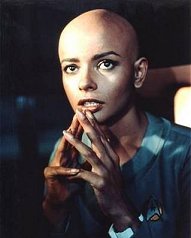 Deltan culture and beliefs.
Deltan culture and beliefs.
Deltans do not see love, sexuality and emotion in the regulated, compartmentalised and ritualistic manner that say humans do. to a Deltan there is no labelling and compartmentalising of the emotions. This is unnatural to them. Whereas with humans there is a label attached to friends as 'friend', or 'best-friend', 'girlfriend', 'lover', 'fiance' and 'wife', to a Deltan these are all artificial designations for a natural continuum. Deltans do not marry, nor do they have husbands/wives. rather it is more that when a pair of Deltans are attracted to each other they do not constrain their emotion. They pair together as long as the feeling lasts, which may be for minutes or a lifetime. multiple partners and pairing between same sex Deltans occurs as naturally as the pairing between any other. Deltans look upon marriage as yet another artificial construct that forces two people to be together for the rest of their lives, not accounting for a change in feelings between the partners over time, nor a realisation that the feelings were not as strong as was first thought. Deltans see love and companionship as natural continua and divorce as an artificial result of the artificial nature of marriage in the first place. Hence Deltans do not have an equivalent process to marriage.
Deltans have few sexual taboos and see the 'immature' nature of human sexuality as 'awkward to watch'. They feel humans allow their logical thoughts to override the natural flow of the emotions, turning a romantic situation into a 'questionnaire of likes and dislikes'. Bonding and emotions between Deltans runs deeper than with most other bonding in the universe, transcending spirituality, love and telempathy. It is the depth and quality of emotional bonding that has naturally limited the numbers of Deltans in Starfleet. The pain of tearing themselves away from their kin, the 'lacking a certain something' in being around non-Deltans [especially non-psi races] and the constraints of the Oath of Celibacy all conspire to deter Deltans from joining Starfleet. After all, the Oath goes against the very natural essense of a Deltan.
 Deltans are a very 'balanced race - mixing intelligence with emotion effortlessly, bringing art, aesthetics and emotional intelligence to the Federation mix. Deltans sexuality is far more complicated than a human perspective implies. They do not just engage in free love and swinging mindlessly, rather there are far more levels and depths to the interactions. Where on Earth the Inuit indians have many words for 'snow', so Deltans have many words relating to love, sex, friendship etc. The Deltan greeting commonly encountered is '' H'lelan'the'' [spoken in a manner not too dissimilar to elvish in LOTR] - there is no direct translation. [it refers to one being loved/cared for/ liked - kind of like in Sheffield where locals say 'Ay up matey' and the response is invariably 'Aye, a'right' - see film 'The Full Monty' with the car-in-the-canal scene for a better explanation]. Deltan language has the most words of any Federation or known world for emotion and emotional states.
Deltans are a very 'balanced race - mixing intelligence with emotion effortlessly, bringing art, aesthetics and emotional intelligence to the Federation mix. Deltans sexuality is far more complicated than a human perspective implies. They do not just engage in free love and swinging mindlessly, rather there are far more levels and depths to the interactions. Where on Earth the Inuit indians have many words for 'snow', so Deltans have many words relating to love, sex, friendship etc. The Deltan greeting commonly encountered is '' H'lelan'the'' [spoken in a manner not too dissimilar to elvish in LOTR] - there is no direct translation. [it refers to one being loved/cared for/ liked - kind of like in Sheffield where locals say 'Ay up matey' and the response is invariably 'Aye, a'right' - see film 'The Full Monty' with the car-in-the-canal scene for a better explanation]. Deltan language has the most words of any Federation or known world for emotion and emotional states.
It is a misconception that Deltans engage in constant acts of intercourse. The reputation of Deltans as a 'race of swingers' and 'making love like we shake hands' is a misunderstanding. Deltans have over 30 words for 'lover', 'mate', 'partner', 'fiancee' etc. And most sensual encounters are, in fact, non penetrative or sexual encounters. Were this myth true, the Deltans population would have exploded out of control centuries ago. In addition, with so much time expended on this 'daily orgy', the Deltans would not have had time to develop socially or technologically. Deltan sensuality has evolved far beyond full human understanding, it can only be visualised as a continuum from simple touching to full sexual intimacy. Deltans use the encounters to fully explore the feelings, mood and context of the intimacy. It is never a mindless act of pleasure with no feeling.
 To a Deltan, the most important family relationships are between siblings and parent/child. As previously explained, the relationships between parents themselves can be transitory, whereas these bloodties are permenent. Deltans do not possess surnames as such, rather they cite to whom they are blood related. Deltans also do not possess a religion, rather they celebrate nature and life, truly living the philosophy of living each day to the full. Death is seen as the natural end of the cycle of life. Blood family for a Deltan is constant, even though relationships can blossom and die within the structure.
To a Deltan, the most important family relationships are between siblings and parent/child. As previously explained, the relationships between parents themselves can be transitory, whereas these bloodties are permenent. Deltans do not possess surnames as such, rather they cite to whom they are blood related. Deltans also do not possess a religion, rather they celebrate nature and life, truly living the philosophy of living each day to the full. Death is seen as the natural end of the cycle of life. Blood family for a Deltan is constant, even though relationships can blossom and die within the structure.
I have already devised the morning ritual of cha'uud and thought about the naturalistic nature of Deltans - they live and work in harmony with nature. I see Deltans as having a simplistic, uncomplicated view of the universe - especially in matters of sensuality and romance. By comparison humans are awkward and approach romance like a questionnaire of likes and dislikes. Deltan relationships are very different to human ones, there are more designations beyond 'friend' 'mate' 'lover' husband' - lots of shades in-between.
Deltan cities work with the flow of nature, curving with the shape of the cliffs and mountains of delta IV. Deltans are as smart as Vulcans and their architecture and creativity reflect this. Deltan culture explores the inner mind, through media such as painting, sculpting and various telempathic and telepathic techniques. For Ilani, this is very different from her world of Starfleet and exploring the stars and other worlds.
Sports are another field in which Deltans excel - very useful in a world where the most common form of transport is on foot, swimming and sailing. Ilani herself is like an olympic swimmer, although her time in Starfleet has meant she doesn't swim as often or as far as she'd normally would have. Exploring experiences are another pastime which Deltans engage in - exploring an emotion or sensation as a group and comparing how another person experiences the same phenomenon. Does someone experience green the same? what about the smell of lavender?
 Deltan communities are rather close-knit affairs. With the culture and the telempathic traits, there is virtually no scope for secrets - especially guilty ones. Obviously there are codes against scanning the mind of another without consent, but this does not stop surface emotions being sensed - or stronger deeper emotions for that matter. Conversations can be conducted by mental imagery and telempathy, but usually this is supplemented with linguistic exchanges.
Deltan communities are rather close-knit affairs. With the culture and the telempathic traits, there is virtually no scope for secrets - especially guilty ones. Obviously there are codes against scanning the mind of another without consent, but this does not stop surface emotions being sensed - or stronger deeper emotions for that matter. Conversations can be conducted by mental imagery and telempathy, but usually this is supplemented with linguistic exchanges.
The telempathic nature of Deltans means that the inflicting of pain or violence is abhorrant to them. This shapes the form of their laws which rely more on periods of isolation and banishment as punishment rather than anything involving pain. Deltan starfleet officers have been known to carry on this traditional belief, although the distance of starships from one another means that the decision to use phasers or photon torpedoes can still be made - especially in tthe defence of loved ones and friends.
Deltan education is similar in many respects to human, except it is supplemented by telempathic and telepathic techniques. Children can learn concepts directly from the teacher or their parents - facilitating education and adding to the enhanced intelligence of the Deltans. No longer are words a limiting factor in describing concepts or sensations.
Government is a non-localised phenomenon. There is no parliment - only a nominated representative which can change to suit the situation. This gives the Deltans robustness of democracy and the right politician for the right situation. Given the archipeligo nature of the islands of Delta IV, often the islands govern themselves - linked by a collective consciousness of a quite Jungian nature.
 On their native world of Delta IV, Deltans have no concern for the monitoring or passage of time - it doesn't matter to them. Activities take as long as they need to and there is no need to rush. This world could be seen by off-worlders as the idylic paradise away from the pressure of living - perhaps this could be a reason the Deltans don't want too many out-siders on their world, exuding stressful emotions and disrupting the paradise which is Delta IV.
On their native world of Delta IV, Deltans have no concern for the monitoring or passage of time - it doesn't matter to them. Activities take as long as they need to and there is no need to rush. This world could be seen by off-worlders as the idylic paradise away from the pressure of living - perhaps this could be a reason the Deltans don't want too many out-siders on their world, exuding stressful emotions and disrupting the paradise which is Delta IV.
Technology on Delta IV blends in with the natural environment. Technology is seen as something to be used when appropriate, not something to be used lightly nor dominate ones life with. Most technology is invisible until it is used. The medical technology of the Deltans is impressive, especially the mental medical techniques. A significant number of the Federation's discoveries of emotional therapies and mental recuperation techniques were gleaned from the Deltans [others were gained from the Vulcans and Betazoids]. There is an impressive collection of clinics on the moons of Delta IV.
Starfleet has an annex on Seyann, where there is one of the best schools of psychology. It was here that Hawkins and O'Reilly studied during their Academy years. Hawkins was studying psychology, O'Reilly was studying Deltan engineering techniques. One incident saw O'Reilly tempting Hawkins to beam down the planet for a dare - after all, it was forbidden. Hawkins obeyed the rules and stayed on the moon. O'Reilly beamed down to the planet and explored for some considerable time before he was returned to the moon. Despite punishment for it, O'Reilly said it was worth it and Hawkins partly regretted not going. Hearing about experiences is not the same as experiencing them himself.
Breakfast rituals, food and other daily routines.
Deltans. Well they're empathic to a high degree, so they're not going to be meat eaters as the thought of killing other animals is abhorant to them. [Just like another inspiration fromyesterday - my Buddhist friends]. So Deltans are vegetarians [at least, if not vegan]. My thought was what do they have for breakfast - a question that later developed into what do they do at breakfast.
Cha-uud.
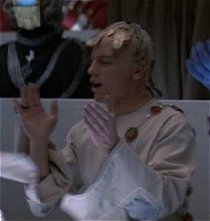
Cha-uud is the morning ritual of a Deltan. It is a combination of meditation, tai-chi style exercises and the consumption of a natural and healthy breakfast. On Delta IV, a Deltan is able to perform Cha-uud in the traditional sense, without having to worry about the sensibilities of other 'less-advanced' races. Upon awakening a Deltan will gravitate to the centre of the house - the meditation room - where they editate on the dreams and memories of the previous day and night. A Deltan may perform this ritual either nude or wearing the kimono-like attire that they have - a Scileestra.
This meditation prepares the mind and spirit for the day ahead, resolving issues from the previous day and clearing the mind ready for the coming events and challenges. After this comes the Vuu-chola exercises [very similar to Tai-chi] which prepares the body. mind and spirit for the day ahead. Following these periods of mindfulness and exercise, the Deltan then has a breakfast of fruits, grains, nuts and salad. This food is considered a means of purifying the body - very much a 'you are what you eat' culture. Once the Deltan has undergone these three rituals, they are then ready for the day ahead.
Author's notes: ok I'm a meat-eater myself and absolutely no expert on vegetarianism. However, i have had some experience with buddhists and their diets and rituals, and this has inspired some of the rituals and foods herein. Doubtless the Deltan diet is varied and changes, just as I change form Fruit n Fibre to Just Right.
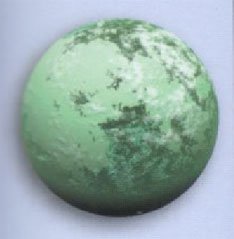
 The Deltan home.
The Deltan home.
I've had a lot of thought on this one too. I wanted to get away from the traditional model of a house in the 23rd/24th century [we'll be popping in on Mr Hawkins' house at some point...]. I thought of a home where there is no television, and the focus is on mindfulness, being, nature, mind, body and soul. I therefore see a home on a sort of figure-8 shape, with a central, natural room with plants in it, a meditation area and perhaps a water feature like a waterfall or such-like.
With the scenary of Ilani's city being mountainous and spread out, I though her family home - like most others - would have a fantastic view of the ocean, whilst up in the moutains. Cool clear sea air. What a great medium to describe in a story (!).
With the structure of a Deltan family being close, Ilani and her family would all live together i this big house, Ilani's room being untouched when she was away, save for it being cleaned and maintained. I see balconies on the house and vast window/doors which allow the best views of the scenary and outside world - Deltans truly like to be one with nature.
I reviewed Star Trek: The Motion Picture Special Edition with Mike Okuda's text commentary on. Here's what Mike had to say about Deltans, when Ilia first steps into the Bridge:
'Ilia, played by Persis Khambatta, was originally conceived as a new character for the Star Trek: Phase II TV series. Since Leonard Nimoy declined to return as Spock for the planned series, Lt Ilia was intended to be a bridge officer from another world, one whose culture was alien to humans. Just as Vulcan culture was dominated by logic, Roddenberry intended for Ilia's culture to be dominated by sexuality. Ilia's ''Oath of Celibacy'' was a reference to this bit of character background. It was probably intended to help ensure that the show would remain suitable for family viewing'.
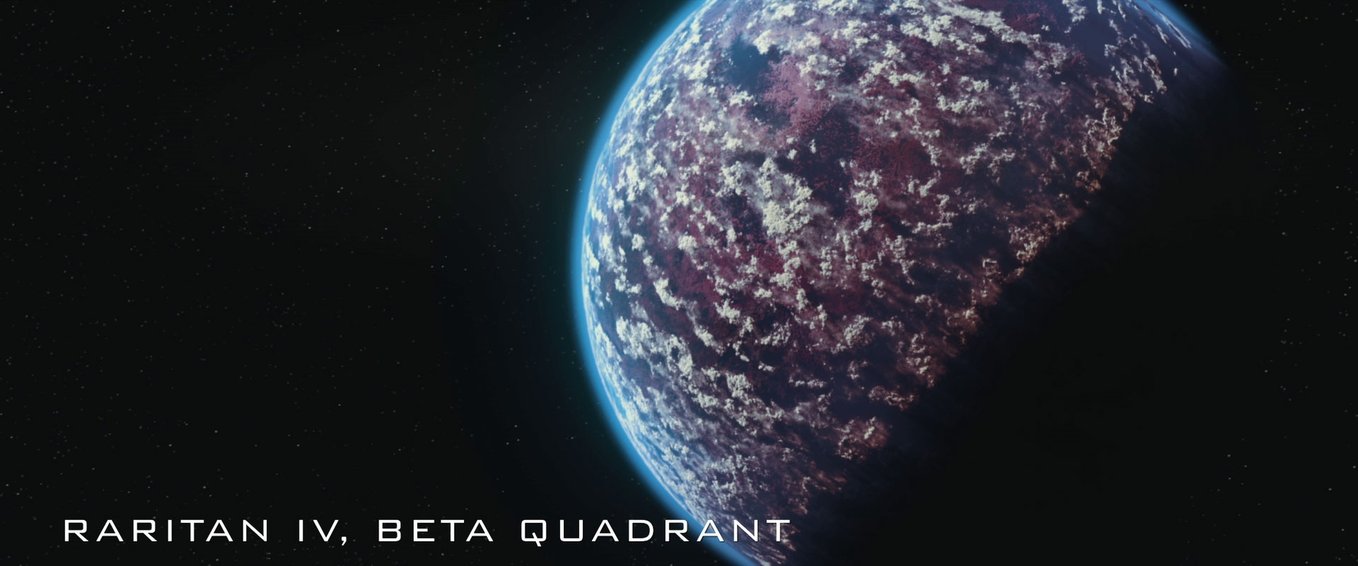
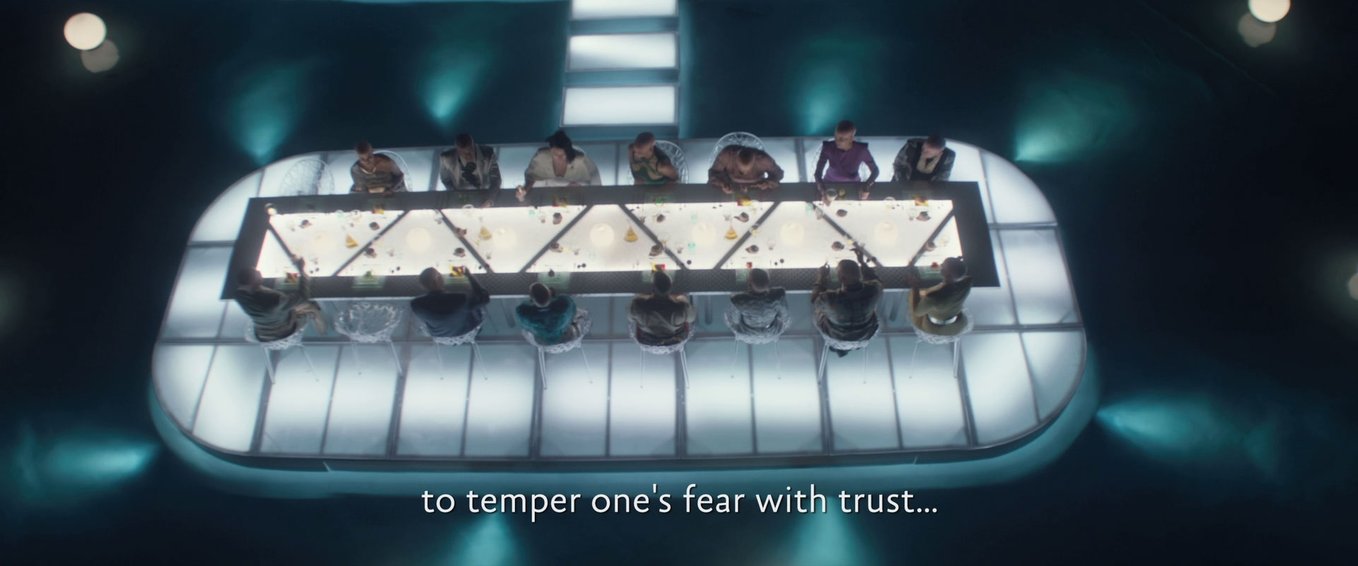
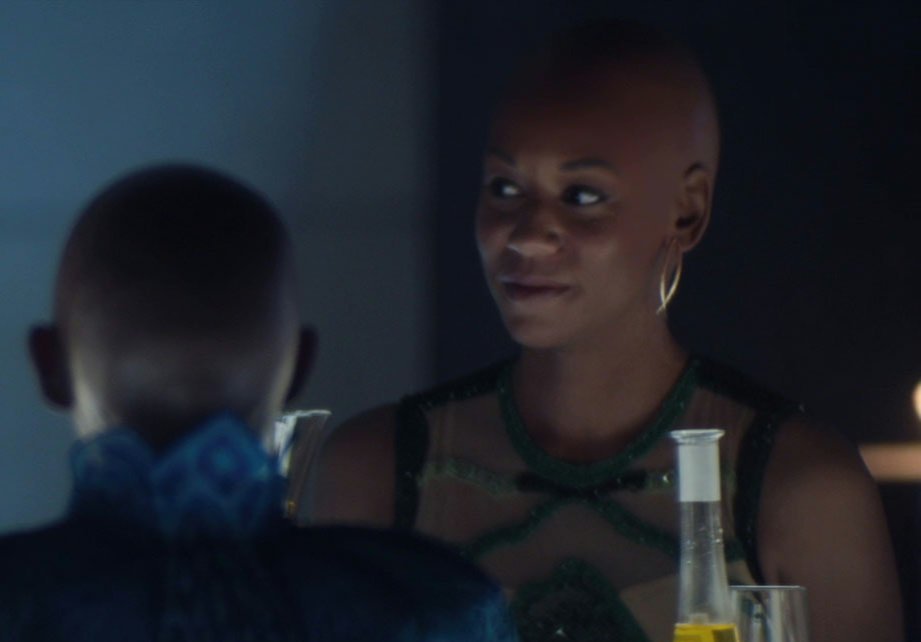
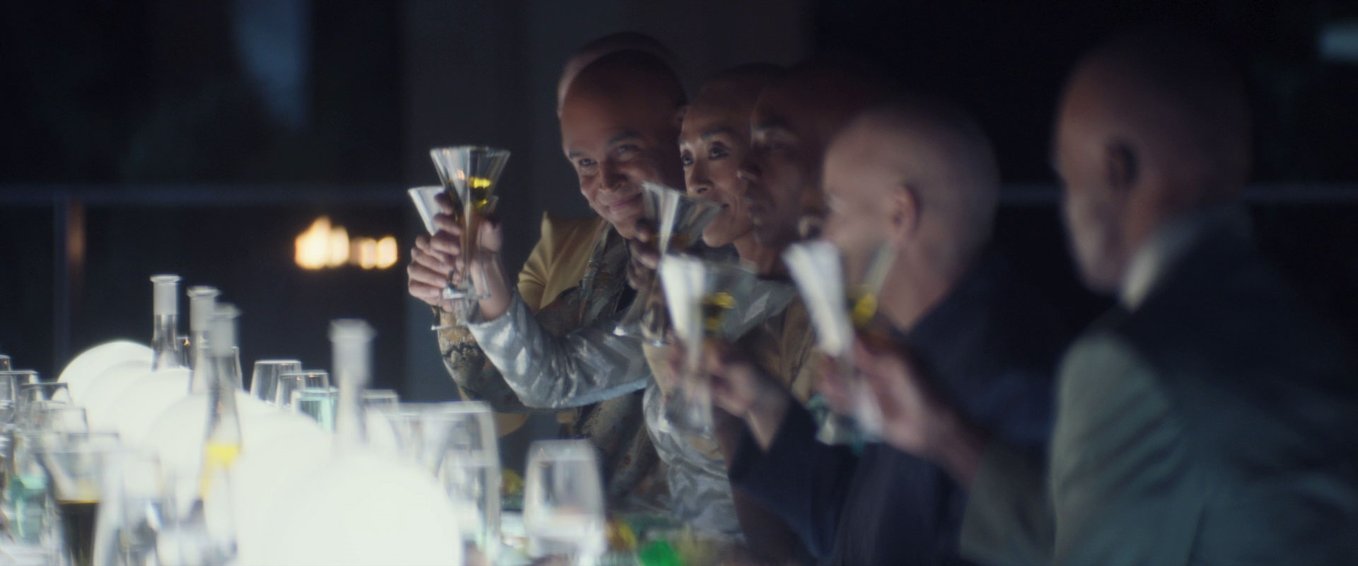
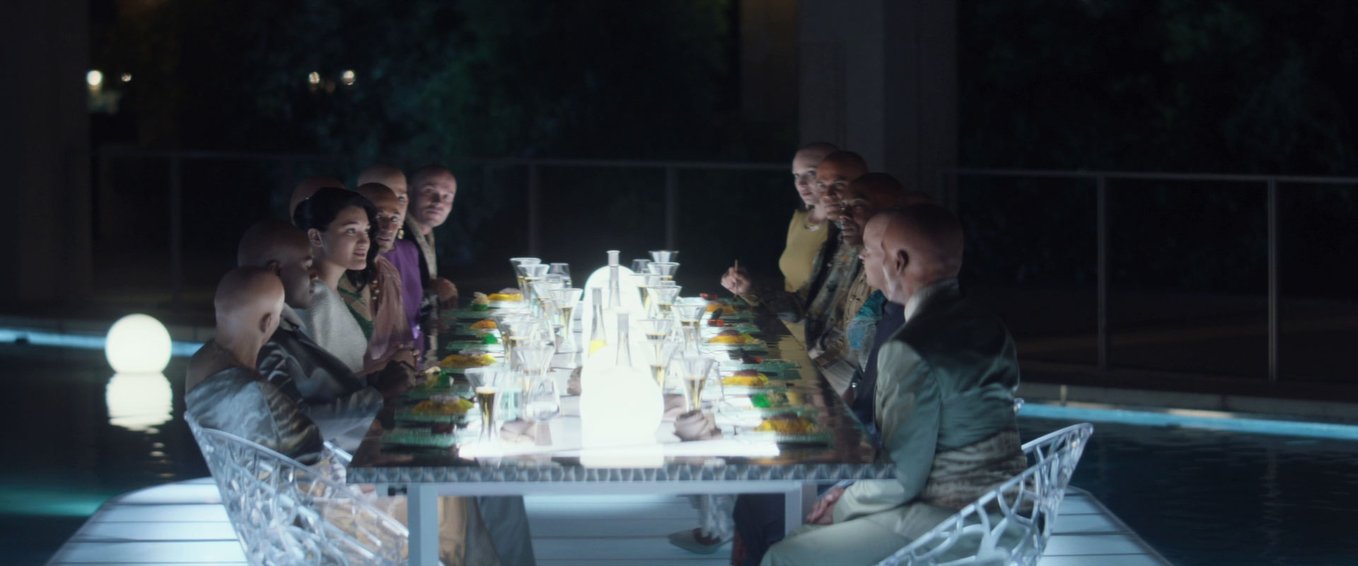
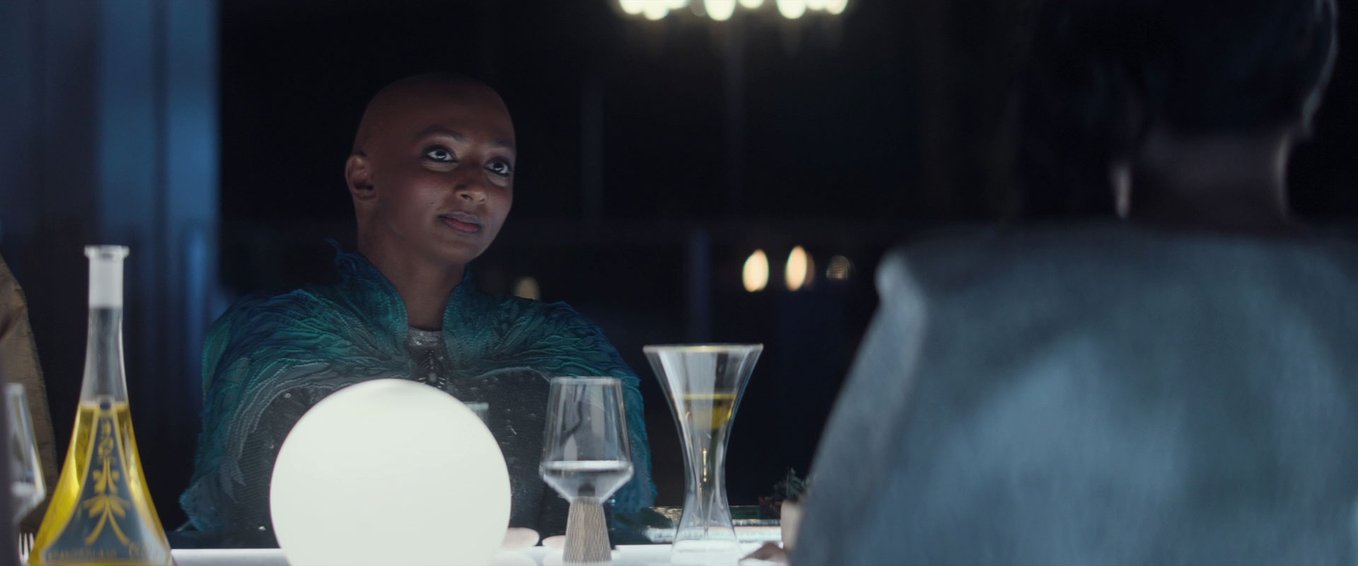










 Overview of the Deltans.
Overview of the Deltans. Sources:
Sources: Deltan culture and beliefs.
Deltan culture and beliefs. Deltans are a very 'balanced race - mixing intelligence with emotion effortlessly, bringing art, aesthetics and emotional intelligence to the Federation mix. Deltans sexuality is far more complicated than a human perspective implies. They do not just engage in free love and swinging mindlessly, rather there are far more levels and depths to the interactions. Where on Earth the Inuit indians have many words for 'snow', so Deltans have many words relating to love, sex, friendship etc. The Deltan greeting commonly encountered is '' H'lelan'the'' [spoken in a manner not too dissimilar to elvish in LOTR] - there is no direct translation. [it refers to one being loved/cared for/ liked - kind of like in Sheffield where locals say 'Ay up matey' and the response is invariably 'Aye, a'right' - see film 'The Full Monty' with the car-in-the-canal scene for a better explanation]. Deltan language has the most words of any Federation or known world for emotion and emotional states.
Deltans are a very 'balanced race - mixing intelligence with emotion effortlessly, bringing art, aesthetics and emotional intelligence to the Federation mix. Deltans sexuality is far more complicated than a human perspective implies. They do not just engage in free love and swinging mindlessly, rather there are far more levels and depths to the interactions. Where on Earth the Inuit indians have many words for 'snow', so Deltans have many words relating to love, sex, friendship etc. The Deltan greeting commonly encountered is '' H'lelan'the'' [spoken in a manner not too dissimilar to elvish in LOTR] - there is no direct translation. [it refers to one being loved/cared for/ liked - kind of like in Sheffield where locals say 'Ay up matey' and the response is invariably 'Aye, a'right' - see film 'The Full Monty' with the car-in-the-canal scene for a better explanation]. Deltan language has the most words of any Federation or known world for emotion and emotional states. To a Deltan, the most important family relationships are between siblings and parent/child. As previously explained, the relationships between parents themselves can be transitory, whereas these bloodties are permenent. Deltans do not possess surnames as such, rather they cite to whom they are blood related. Deltans also do not possess a religion, rather they celebrate nature and life, truly living the philosophy of living each day to the full. Death is seen as the natural end of the cycle of life. Blood family for a Deltan is constant, even though relationships can blossom and die within the structure.
To a Deltan, the most important family relationships are between siblings and parent/child. As previously explained, the relationships between parents themselves can be transitory, whereas these bloodties are permenent. Deltans do not possess surnames as such, rather they cite to whom they are blood related. Deltans also do not possess a religion, rather they celebrate nature and life, truly living the philosophy of living each day to the full. Death is seen as the natural end of the cycle of life. Blood family for a Deltan is constant, even though relationships can blossom and die within the structure. Deltan communities are rather close-knit affairs. With the culture and the telempathic traits, there is virtually no scope for secrets - especially guilty ones. Obviously there are codes against scanning the mind of another without consent, but this does not stop surface emotions being sensed - or stronger deeper emotions for that matter. Conversations can be conducted by mental imagery and telempathy, but usually this is supplemented with linguistic exchanges.
Deltan communities are rather close-knit affairs. With the culture and the telempathic traits, there is virtually no scope for secrets - especially guilty ones. Obviously there are codes against scanning the mind of another without consent, but this does not stop surface emotions being sensed - or stronger deeper emotions for that matter. Conversations can be conducted by mental imagery and telempathy, but usually this is supplemented with linguistic exchanges. On their native world of Delta IV, Deltans have no concern for the monitoring or passage of time - it doesn't matter to them. Activities take as long as they need to and there is no need to rush. This world could be seen by off-worlders as the idylic paradise away from the pressure of living - perhaps this could be a reason the Deltans don't want too many out-siders on their world, exuding stressful emotions and disrupting the paradise which is Delta IV.
On their native world of Delta IV, Deltans have no concern for the monitoring or passage of time - it doesn't matter to them. Activities take as long as they need to and there is no need to rush. This world could be seen by off-worlders as the idylic paradise away from the pressure of living - perhaps this could be a reason the Deltans don't want too many out-siders on their world, exuding stressful emotions and disrupting the paradise which is Delta IV.

 The Deltan home.
The Deltan home.











